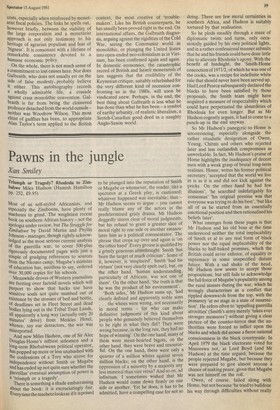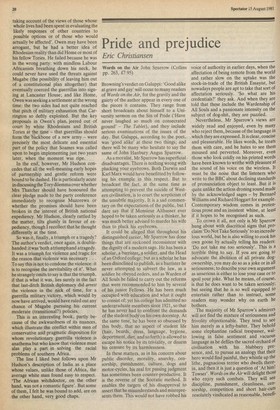Pawns in the jungle
Xan Smiley
Triumph or Tragedy? Rhodesia to Zimbabwe Miles Hudson (Hamish Hamilton Pp. 252, £9.95) Most of us self-styled Africanists, and especially the Zimboons, have plenty of machetes to grind. The weightiest recent book on southern African history — not the apologia under review, but The Struggle for Zimbabwe by David Martin and Phyllis Johnson — manages, though rightly acknowledged as the most serious current analysis Of the guerrilla war, to cover 500-plus rigorously documented pages with just a Couple of grudging references to sources from the Nkomo camp; Mugabe's minister of education has, needless to say, ordered Over 30,000 copies for his schools. Meanwhile droves of Western journalists are fretting over factoid novels which will Purport to show that hacks too have sensitive souls not quite numbed out of existence by the stresses of bed and bottle, of deadlines set in Fleet Street and dead bodies lying out in the Tribal Trust Lands, all apparently a long way (actually only 20 minutes' drive) from Meikles Hotel, Whence, say our detractors, the war was Misreported.
And now Miles Hudson, one of Sir Alec Douglas-Home's niftiest sidesmen and a long-term Rhobabwean political operator, has popped up more or less unabashed with the confessions of a Tory who strove for independence without Smith or Mugabe and has ended up not quite sure whether the guerrillas' eventual assumption of power is a 'triumph or a tragedy'. There is something a shade embarrassing about the book: it is excruciatingly fair. Every time the machete looks as if it is poised to be plunged into the reputation of Smith or Mugabe or whomever, the reader, like a spectator at a Greek play, is cautioned; whatever happened was inevitable; thus — Mr Hudson seems to argue — you cannot really blame any of the actors in the predetermined grisly drama. Mr Hudson doggedly steers clear of moral judgments, but his refusal to grant a greater slice of moral right to one side or another emasculates him as a political commentator. The phrase that crops up over and again is 'on the other hand'.Every grouse is qualified by a grimly generous afterthought. Smith 'has been the target of much criticism'. Some of it, however, is 'misplaced'. Smith 'had his virtues' (not very clearly spelt out), but, on the other hand, 'human understanding, particularly of Africans, was not one of them'. On the other hand, 'the truth is that he was the product of his environment'. 'Both sides,' Mr Hudson sums up, `had clearly defined and apparently noble aims . . . the whites were wrong, not necessarily in moral terms — for who can make definitive judgments of this kind about people who genuinely believed themselves to be right in what they did? They were wrong because, in the long run, they had no hope of winning'. On the one hand, many of them were mean-hearted bigots, on the other hand, they were brave and resourceful. On the one hand, there were only a quarter of a million whites against seven million blacks; on the other hand, is the oppression of a minority by a majority any less immoral than vice versa? And so on, ad infinitum. I sometimes wished that Mr Hudson would come down firmly on one side or another. Yet he does, it has to be admitted, have a compelling case for not so doing. There are few moral certainties in southern Africa, and Hudson is suitably tortured by that realisation.
So he plods steadily through a maze of diplomatic twists and turns, only occasionally guided by his own political lights, and in a rather confessional manner submits that he and his friends could have done little else to alleviate Rhodesia's agony. With the benefit of hindsight, the 'Smith-Home concoction on971/2, of which he was one of the cooks, was a recipe for indefinite white rule that should never have been served up. Had Lord Pearce subsequently declared the blacks to have been satisfied by those proposals, the Smith team might have acquired a measure of respectability which could have perpetuated the absurdities of Rhodesia for even longer. But as Mr Hudson cogently argues, it had to come to a punch-up in the end anyway.
So Mr Hudson's panegyric to Home is unconvincing, especially alongside the rather ritualistic denigration of Owen, Young, Chitnis and others who rejected later and less outlandish compromises as unworkable. In fact, Mr Hudson's praise of Home highlights the inadequacy of decent men with a weak grasp of brutal long-term realities. Home, writes his former political secretary, 'accepted that the world we live in is as it is and did not kick against the pricks. On the other hand he had few illusions', 'he searched indefatigably for consensus' his original premise was that everyone was trying to do his best', 'but like all of us he started from an essentially emotional position and then rationalised his beliefs later'.
What emerges from these pages is that Mr Hudson and his old boss at the time understood neither the total implacability of Smith et al to any real form of black power nor the equal implacability of the blacks to half-baked promises, which the British could never enforce, of equality or supremacy in some unspecified distant future. With a sad shake of the head, Mr Hudson now seems to accept those propositions, but still fails to acknowledge the full force of Mugabe's popularity among the rural masses during the war, which he wrongly characterises as a conflict that rippled downwards from the top, with the peasantry 'at no stage in a state of insurrection'. He refers often to 'appalling guerrilla atrocities' (Smith's army merely 'takes ever stronger measures') without giving a clear picture of the counter-terror that the authorities were forced to inflict upon the blacks and which did arouse a fierce national consciousness in the black countryside. In April 1979 the black electorate voted for Muzorewa not, as Lord Boyd (and Mr Hudson) at the time argued, because the people rejected Mugabe, but because they were prepared to give almost anyone a chance of making peace, given that Mugabe was not himself on the roll.
Owen, of course, failed along with Home, but not because 'he tried to bulldoze his way through difficulties without really taking account of the views of those whose whole lives had been spent in evaluating the likely responses of other countries to possible options or of those who would actually be affected'. Owen may have been arrogant, but he had a better idea of Rhodesian reality than did Home or most of his fellow Tories. He failed because he was in the wrong party: with mindless Labour Africanists breathing down his neck, he could never have used the threats against Mugabe (the possibility of leaving him out of a constitutional plan altogether) that eventually coerced the guerrillas into signing at Lancaster House; and like Home, Owen was seeking a settlement at the wrong time: the two sides had not quite reached that pitch of military exhaustion that Carrington so deftly exploited. But the key proposals in Owen's plan, jeered out of court by white Rhodesians and British Tories at the time — that guerrillas should form the backbone of a new army — were precisely the most delicate and essential part of the policy that Soames was called upon to begin implementing just two years later, when the moment was ripe.
In the end, however, Mr Hudson concedes that all the well-meaning early hopes of partnership and gentle reform were bound to be dashed. He is particularly acute in discussing the Tory dilemma over whether Mrs Thatcher should have honoured the clear pledge made to the party conference immediately to recognise Muzorewa or whether the promises should have been broken in the interest of British national expediency. Mr Hudson, clearly rattled by the matter, tilts glumly in favour of expediency, though I recollect that he thought differently at the time.
So was it, finally, a triumph or a tragedy? The author's verdict, once again, is doublehanded: it was 'both a triumph and a tragedy. It was a triumph for violence and tragic for the reason that violence was necessary . . . To say this is not to condone the violence: it is to recognise the inevitability of it'. What he strangely omits to say is that the triumph, if that is what it was, lies surely in the fact that last-ditch British diplomacy did arrest the violence in the nick of time, for a guerrilla military victory, which would by now have arrived, would have ruled out any chance of Mugabe pursuing his current moderate (transitional?) policies.
This is an interesting book, partly because of the awkwardness of its nuances, which illustrate the conflict within men of conservative and pragmatic disposition for whom revolutionary guerrilla violence is anathema but who know that violence must alas play a part in solving the racial problems of southern Africa.
The line I liked best follows upon Mr Hudson's description of India as a place whose values, unlike those of Africa, the average white man found easy to respect. 'The African witchdoctor, on the other hand, was not a romantic figure'. But some of them, I felt he was bound to add, are on the other hand, very good chaps.



































 Previous page
Previous page